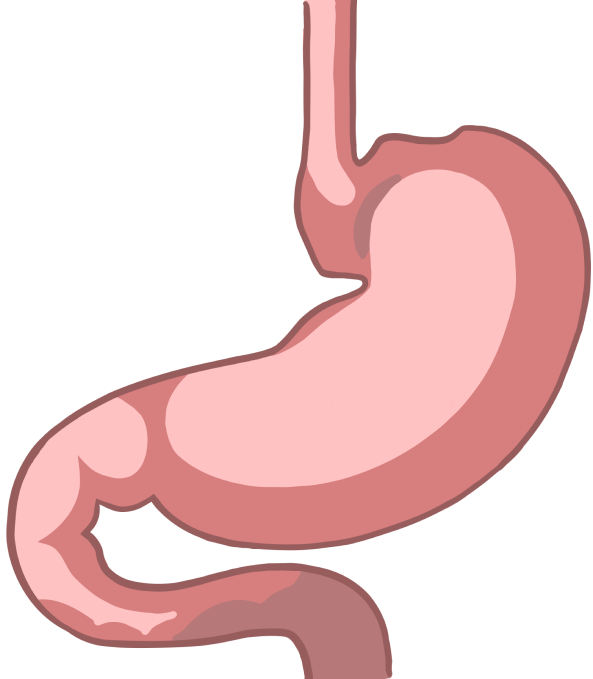Procedure Guide
Adjustable Gastric Banding
Alternative Names : Gastric Band, Lap Band, Bariatric Banding

- Home
- /
- Procedures
- /
- Adjustable Gastric Banding
Gastric Banding offered in Phoenix, Mesa, & Tempe, AZ.
Cost :
Contact
Surgery Length:
30-60 minutes
Anesthesia :
General
Recovery :
Most people return to work
within 1-2 weeks
Synopsis
Gastric banding is a surgical weight loss option that restricts food consumption by placing an inflatable band around the top portion of the stomach.
Benefits Gastric Banding:
Benefits of the gastric band compared to other bariatric surgeries:
Fully reversible when medically indicated
No cutting or stapling of the stomach
Short hospital stay - usually done as an outpatient procedure
Quick recovery
Adjustable without additional surgery
No nutrient malabsorption
Fewer life-threatening complications
Adjustable Gastric Banding Procedure

During the gastric banding procedure, surgeons place an inflatable silicone band around the top portion of the stomach to create a small pouch. When eating, food first passes through the pouch before proceeding through the rest of the digestive system. The gastric band limits the amount of food that can enter the stomach at a time and creates a more immediate feeling of fullness.
Your surgeon can adjust how much you are able to eat by injecting the band with saline to expand or contract it. Since the digestive process remains the same once food passes through the pouch, the body continues to absorb food normally.
Adjustable Gastric Banding Procedure

During the gastric banding procedure, surgeons place an inflatable silicone band around the top portion of the stomach to create a small pouch. When eating, food first passes through the pouch before proceeding through the rest of the digestive system. The gastric band limits the amount of food that can enter the stomach at a time and creates a more immediate feeling of fullness.
Your surgeon can adjust how much you are able to eat by injecting the band with saline to expand or contract it. Since the digestive process remains the same once food passes through the pouch, the body continues to absorb food normally.
Video: Bariatric Bariatric Gastric Band Educational Animation

Bradley Lawlor
“So I have been seeing Dr. DeBarros for about 4 months working on presurgical weight loss. It’s been up and down but Dr. DeBarros is a straight shooter. I appreciate his honesty on frankness. I love that there are multiple locations.”

Bradley Lawlor
“So I have been seeing Dr. DeBarros for about 4 months working on presurgical weight loss. It’s been up and down but Dr. DeBarros is a straight shooter. I appreciate his honesty on frankness. I love that there are multiple locations.”

Bradley Lawlor
“So I have been seeing Dr. DeBarros for about 4 months working on presurgical weight loss. It’s been up and down but Dr. DeBarros is a straight shooter. I appreciate his honesty on frankness. I love that there are multiple locations.”
Am I A Good Candidate ?
The ideal candidate for the gastric band procedure has a Body Mass Index (BMI) above 30.
Pros
Reversibility
Adjustable Gastric Banding is a reversible procedure, meaning the band can be adjusted or removed if necessary, allowing for potential adjustments based on individual needs or circumstances.
Less Invasive
Compared to other bariatric surgeries, such as gastric bypass or sleeve gastrectomy, Adjustable Gastric Banding is a less invasive procedure. It involves placing an adjustable band around the upper part of the stomach, without stapling or cutting the stomach or rerouting the intestines.
Reduced Risks
Adjustable Gastric Banding generally has lower risks of major complications compared to other bariatric surgeries. The procedure has a lower risk of nutrient deficiencies and malabsorption since it doesn't involve rerouting the digestive system.
Gradual Weight Loss
The weight loss achieved with Adjustable Gastric Banding tends to be more gradual compared to other procedures. This can be advantageous for individuals who prefer a slower and steady weight loss trajectory.
Cons
Lesser Weight Loss
Adjustable Gastric Banding typically results in less weight loss compared to procedures like gastric bypass or sleeve gastrectomy. Some individuals may find that the weight loss achieved is not as substantial as they desired.
Band-related Issues
Complications related to the adjustable gastric band may occur, such as band slippage, band erosion, or band intolerance. These issues may require additional procedures or adjustments, potentially leading to additional risks and discomfort.
Adjustments and Follow-Up Care
Adjustable Gastric Banding requires regular follow-up visits for band adjustments and monitoring. Frequent adjustments may be needed to optimize weight loss and manage potential side effects. The need for ongoing follow-up care can be challenging for some individuals.
Less Impact on Metabolic Conditions
Unlike gastric bypass surgery, Adjustable Gastric Banding may have a lesser impact on resolving or improving metabolic conditions like type 2 diabetes or high blood pressure.
After Gastric Banding .
After gastric band surgery, patients follow up as needed after their first post-op visit to monitor weight loss and adjust the band. Most patients return to work within a week and can begin physical activity within 6 weeks.
After surgery, food intake will consist of liquids, well-chewed solids, and small amounts of protein foods like fish and meats. Continued nutritious choices and physical activity are necessary to maximize weight loss.
Results
On average, patients can expect to lose about 40% of their excess weight within the first year after surgery
In line with recommended weight loss guidelines for sustainable weight reduction, gastric banding usually promotes weight loss of two to three pounds per week.
It's important to note that weight loss may be more gradual compared to other bariatric procedures.
Gastric banding will result in slow, steady weight loss compared to other procedures such as sleeve gastrectomy or gastric bypass. Studies show that two years after these procedures, patients enjoy similar amounts of weight loss.
Adjustability and Customization
One advantage of gastric band surgery is the ability to adjust the band's tightness, allowing for customization based on individual needs and weight loss progress. Adjustments can be made during follow-up visits to optimise weight loss and manage potential side effects.
FAQ
- What is gastric band surgery?
- How does gastric band surgery help with weight loss?
- Is gastric band surgery reversible?
- What is the recovery period like after gastric band surgery?
- Will I need to make dietary changes after gastric band surgery?
- How long does it take to see weight loss results after gastric band surgery?
- Are there any potential risks or complications associated with gastric band surgery?
- Will I be able to eat normally after gastric band surgery?
- How long does the gastric band remain in place?
FAQ .
What is gastric band surgery?
Gastric band surgery, also known as adjustable gastric banding, is a surgical procedure that involves placing an adjustable band around the upper part of the stomach. This creates a smaller pouch, limiting the amount of food that can be consumed.
Is gastric band surgery reversible?
Yes, gastric band surgery is reversible. The adjustable band can be removed or adjusted if needed. However, it's important to consult with your healthcare professional before considering any changes to the procedure.
How does gastric band surgery help with weight loss?
Gastric band surgery promotes weight loss by restricting the amount of food that can be eaten. The smaller stomach pouch created by the band limits the amount of food that can be consumed at one time, leading to reduced calorie intake and weight loss.
What is the recovery period like after gastric band surgery?
The recovery period after gastric band surgery is typically shorter compared to other bariatric procedures. Most patients can return to normal activities within a few days to a week after the surgery. However, it's important to follow post-operative guidelines provided by your healthcare team for a smooth recovery.
Will I need to make dietary changes after gastric band surgery?
Yes, dietary changes are necessary after gastric band surgery. You will be advised to follow a specific post-operative diet plan that includes gradual progression from liquids to solid foods. You will also need to adopt long-term dietary changes, such as smaller portion sizes and healthy food choices, to support weight loss and overall health.
How long does it take to see weight loss results after gastric band surgery?
Weight loss results vary among individuals. Typically, patients start to see noticeable weight loss within the first few months after surgery. The rate of weight loss may vary, and it's important to have realistic expectations and follow the guidelines provided by your healthcare team.
Are there any potential risks or complications associated with gastric band surgery?
While gastric band surgery is generally considered safe, there are potential risks and complications. These can include band slippage, band erosion, infection, bleeding, or intolerance to the band. Regular follow-up visits with your healthcare team are important to monitor for and address any potential issues.
Will I be able to eat normally after gastric band surgery?
While you will be able to eat solid foods after recovery, portion sizes will be significantly smaller. The goal is to promote healthy eating habits and portion control for long-term weight management.
How long does the gastric band remain in place?
The gastric band is designed to be a long-term implant. It can remain in place indefinitely if it is functioning well and not causing any complications. However, there may be circumstances where the band needs to be adjusted, replaced, or removed.
1. Will I need additional follow-up surgeries or adjustments?
2. Can I get pregnant after gastric band surgery?
4. Will I need to take vitamin or mineral supplements after gastric band surgery?
